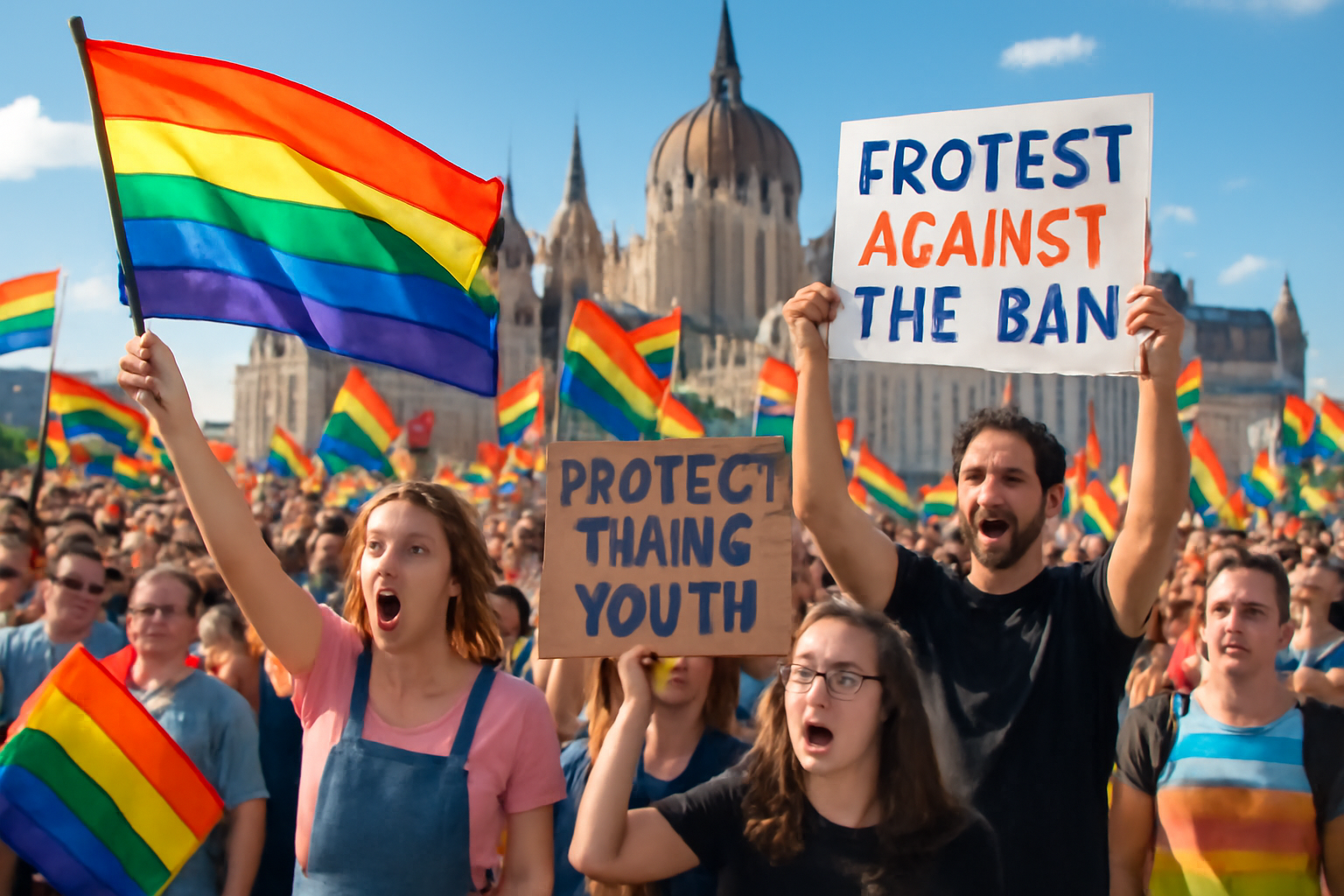
In a shocking move, the Hungarian Parliament has passed a controversial law that bans Pride events across the nation and permits the use of facial recognition software to track attendees. The law, supported by Prime Minister Viktor Orbán’s Fidesz party and the Christian Democrats, was passed with a 136-27 vote. It has drawn widespread condemnation from both domestic and international communities.
Protests and Outrage in Budapest
Following the law's passage, thousands of protestors took to the streets of Budapest, the capital of Hungary, to express their discontent. The protestors demonstrated outside the Parliament building, while opposition lawmakers inside set off rainbow-colored smoke bombs to voice their dissent.
Later, protestors blocked key thoroughfares, including the iconic Erzsebet Bridge over the Danube River, demanding the government retract the law. The police ordered the protestors to disperse, but the crowd remained defiant, highlighting the growing tension between the ruling party and those advocating for LGBTQ+ rights.
Echoes of Russia’s Policies
Evgeny Belyakov, a Russian expatriate living in Hungary, expressed his concerns about the new law, drawing parallels with similar oppressive measures in Russia. “It’s quite terrifying to be honest, because we had the same in Russia. It was building up step by step, and I feel like this is what is going on here,” Belyakov remarked. He hopes for more resistance in Hungary, emphasizing the need to act before it’s too late.
Legal and Social Implications
The new law stipulates a fine of approximately $550 for attending or organizing events that may feature "depiction or promotion" of homosexuality, especially where minors might be present. This legislation is an extension of Hungary's 2021 "child protection" law, which restricts exposure to LGBTQ+ topics in schools and media.
This legislative move has sparked a global debate about human rights and the protection of LGBTQ+ individuals within Hungary. The European Union, of which Hungary is a member, has already challenged the country’s previous laws on the grounds of discrimination based on sexual orientation and gender identity.
International Reactions
Budapest Pride organizers released a statement condemning the law, stating, “This is not child protection, this is fascism.” The organizers and other LGBTQ+ advocates argue that the law further marginalizes the community and restricts fundamental freedoms.
Various international leaders and human rights organizations have denounced Hungary’s decision, calling for increased protection of minority rights. The European Union has previously taken legal action against Hungary for similar laws, and this recent development is likely to escalate tensions between Hungary and the EU.
Despite the overwhelming opposition, the Hungarian government maintains that the law is necessary to protect children from content it deems inappropriate. However, critics argue that such legislation undermines democracy and freedoms that are the bedrock of the European Union.
Call to Action
The passage of this law has mobilized activists and allies worldwide to rally in support of Hungarian LGBTQ+ communities. Many are calling for immediate action, urging the international community to apply pressure on the Hungarian government to revoke the law.
As protests continue in Budapest and beyond, the Hungarian LGBTQ+ community remains steadfast in their fight for rights and recognition. The international community watches closely, hoping for a resolution that upholds human rights and equality for all.
Stay informed about global LGBTQ+ issues by subscribing to our newsletter. Receive the latest updates directly to your inbox and join the conversation about equality and justice.
The situation in Hungary is a poignant reminder of the ongoing struggle for LGBTQ+ rights around the world. As these events unfold, it is crucial to continue advocating for inclusivity, understanding, and acceptance in every corner of the globe.
Related Posts
Triumphant Trans Woman Wins Legal Battle and Inspires Others to Stand Up for Their Rights
Breaking new ground: a landmark victory in transgender rights After battling in courtrooms and enduring endless challenges, Diana Portillo, a transgender woman, has secured a monumental victory in her decade-long fight against workplace discrimination. The result? Nearly $1 million awarded in a historic settlement. But this isn't just a win on paper—it represents a powerful precedent in combati [...]
Pride Month in Latin America: Protests and Demands for Equality
**Celebrating Pride and advocating LGBTQ+ rights in Latin America** Pride Month in Latin America was a lively mix where celebration met activism. Communities united, not just throwing a party but making a stand—demanding equality and pushing governments toward better protection and rights recognition. Throughout Latin America, pride events erupted in marches and cultural displays, each with a c [...]
Transgender Erasure Actions Implemented by National Park Service
```html Trump administration's impact on national park service and transgender recognition The Trump administration made notable moves in undermining transgender representation, which included directing agencies like National Park Service not include "T" and "Q" when they refered “LGBTQ” in any official communication. This move seems part a broader plan by this administration aimed at reducin [...]